|
|
|
Sort Order |
|
|
|
Items / Page
|
|
|
|
|
|
|
| Srl | Item |
| 1 |
ID:
121096


|
|
|
|
|
| Publication |
2013.
|
| Summary/Abstract |
How strong are normative prohibitions on state behavior? We examine this question by analyzing anti-nuclear norms, sometimes called the "nuclear taboo," using an original survey experiment to evaluate American attitudes regarding nuclear use. We find that the public has only a weak aversion to using nuclear weapons and that this aversion has few characteristics of an "unthinkable" behavior or taboo. Instead, public attitudes about whether to use nuclear weapons are driven largely by consequentialist considerations of military utility. Americans' willingness to use nuclear weapons increases dramatically when nuclear weapons provide advantages over conventional weapons in destroying critical targets. Americans who oppose the use of nuclear weapons seem to do so primarily for fear of setting a negative precedent that could lead to the use of nuclear weapons by other states against the United States or its allies in the future.
|
|
|
|
|
|
|
|
|
|
|
|
|
|
|
|
| 2 |
ID:
065873
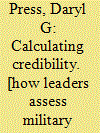

|
|
|
|
|
| Publication |
Ithaca, Cornell University Press, 2005.
|
| Description |
ix, 218p.
|
| Series |
Cornell studies in security affairs
|
| Contents |
Theories of credibility-the"appeasement" crises: German assessments of British and French credibility, 1938-39--Crises over Berlin: American and British assessments of Sovietvcredibility, 1958-61--Missiles in Cuba: American assessments of Soviet credibility, 1962
|
| Standard Number |
9780801443435
|
|
|
|
|
|
|
|
|
|
|
|
Copies: C:1/I:0,R:0,Q:0
Circulation
| Accession# | Call# | Current Location | Status | Policy | Location |
| 050177 | 355.02/PRE 050177 | Main | On Shelf | General | |
|
|
|
|
| 3 |
ID:
069578
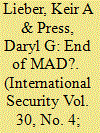

|
|
|
| 4 |
ID:
120175
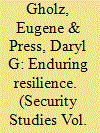

|
|
|
|
|
| Publication |
2013.
|
| Summary/Abstract |
Plentiful spare capacity persists in the oil production and tanker industries, contrary to Michael Levi's contention in his response to our earlier article, "Protecting 'The Prize.' " OPEC leaders retain excess capacity to minimize cartel members' cheating, and tanker companies retain considerable flexibility that allows them to adapt to political-military and other fluctuations in the market. Oil supplies are not on a knife-edge; exaggerated claims of energy vulnerability distort U.S. national security policy.
|
|
|
|
|
|
|
|
|
|
|
|
|
|
|
|
| 5 |
ID:
159476
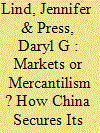

|
|
|
|
|
| Summary/Abstract |
Since oil began fueling the global economy, governments have employed policies of “energy mercantilism” to secure access to this key input. Critics of these policies claim they are unnecessary because oil can be acquired on global markets. Countries such as China that engage in energy mercantilism are thus neither enhancing their energy security nor threatening others' access to oil. These critics, however, misunderstand the logic of energy mercantilism, which is rooted in the economics and business literatures on supply chain management. Firms and states are correct to worry about access to critical supplies under four conditions: imperfect contracting, supplier collusion, geographic concentration, and high risk of conflict. All of these conditions plague the oil industry. Likewise, the energy mercantilist policies that critics deride are analogous to the strategies that firms adopt to protect their supply chains. China's steps to ensure access to oil have enhanced its energy security and reduced U.S. coercive options toward Beijing. More broadly, the unfolding competition over energy access highlights the lingering power of mercantilism, even in this age of economic globalization and the apparent triumph of market liberalism.
|
|
|
|
|
|
|
|
|
|
|
|
|
|
|
|
| 6 |
ID:
152915
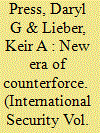

|
|
|
|
|
| Summary/Abstract |
Nuclear deterrence rests on the survivability of nuclear arsenals. For much of the nuclear age, “counterforce” disarming attacks—those aimed at eliminating an opponent's nuclear forces—were nearly impossible because of the ability of potential victims to hide and protect their weapons. Technological developments, however, are eroding this foundation of nuclear deterrence. Advances rooted in the computer revolution have made nuclear forces around the world considerably more vulnerable. Specifically, two key approaches that countries have relied on to ensure arsenal survivability since the dawn of the nuclear age—hardening and concealment—have been undercut by leaps in weapons accuracy and a revolution in remote sensing. Various methods, evidence, and models demonstrate the emergence of new possibilities for counterforce disarming strikes. In short, the task of securing nuclear arsenals against attack is far more difficult than it was in the past. The new era of counterforce challenges the basis for confidence in contemporary deterrence stability, raises critical issues for national and international security policy, and sheds light on one of the enduring theoretical puzzles of the nuclear era: why international security competition has endured in the shadow of the nuclear revolution.
|
|
|
|
|
|
|
|
|
|
|
|
|
|
|
|
| 7 |
ID:
098788
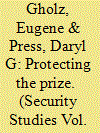

|
|
|
|
|
| Publication |
2010.
|
| Summary/Abstract |
American national security policy is based on a misunderstanding about U.S. oil interests. Although oil is a vital commodity, potential supply disruptions are less worrisome than scholars, politicians, and pundits presume. This article identifies four adaptive mechanisms that together can compensate for almost all oil shocks, meaning that continuous supply to consumers will limit scarcity-induced price increases. The adaptive mechanisms are not particularly fragile and do not require tremendous foresight by either governments or economic actors. We illustrate these mechanisms at work using evidence from every major oil disruption since 1973. We then identify the small subset of disruptive events that would overwhelm these adaptive mechanisms and therefore seriously harm the United States. Finally, we analyze the utility of U.S. foreign military policy tools in addressing these threats. Our findings suggest that the United States can defend its key interests in the Persian Gulf-the world's most important oil-producing region-with a less-intrusive, "over the horizon" posture.
|
|
|
|
|
|
|
|
|
|
|
|
|
|
|
|
| 8 |
ID:
176438
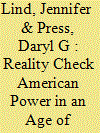

|
|
|
| 9 |
ID:
068235
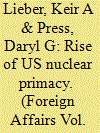

|
|
|
| 10 |
ID:
122086
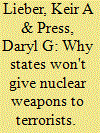

|
|
|
|
|
| Publication |
2013.
|
| Summary/Abstract |
Many experts consider nuclear terrorism the single greatest threat to U.S. security. The fear that a state might transfer nuclear materials to terrorists was a core justification for the invasion of Iraq in 2003 and, more recently, for a strike against Iran's nuclear program. The logical basis for this concern is sound: if a state could orchestrate an anonymous nuclear terror attack, it could destroy an enemy yet avoid retaliation. But how likely is it that the perpetrators of nuclear terrorism could remain anonymous? Data culled from a decade of terrorist incidents reveal that attribution is very likely after high-casualty terror attacks. Attribution rates are even higher for attacks on the U.S. homeland or the territory of a major U.S. ally-97 percent for incidents in which ten or more people were killed. Moreover, tracing a terrorist group that used a nuclear weapon to its state sponsor would not be difficult, because few countries sponsor terror; few terror groups have multiple sponsors; and only one country that sponsors terrorism, Pakistan, has nuclear weapons or enough material to manufacture them. If leaders understand these facts, they will be as reluctant to give weapons to terrorists as they are to use them directly; both actions would invite devastating retaliation.
|
|
|
|
|
|
|
|
|
|
|
|
|
|
|
|
|
|
|
|
|